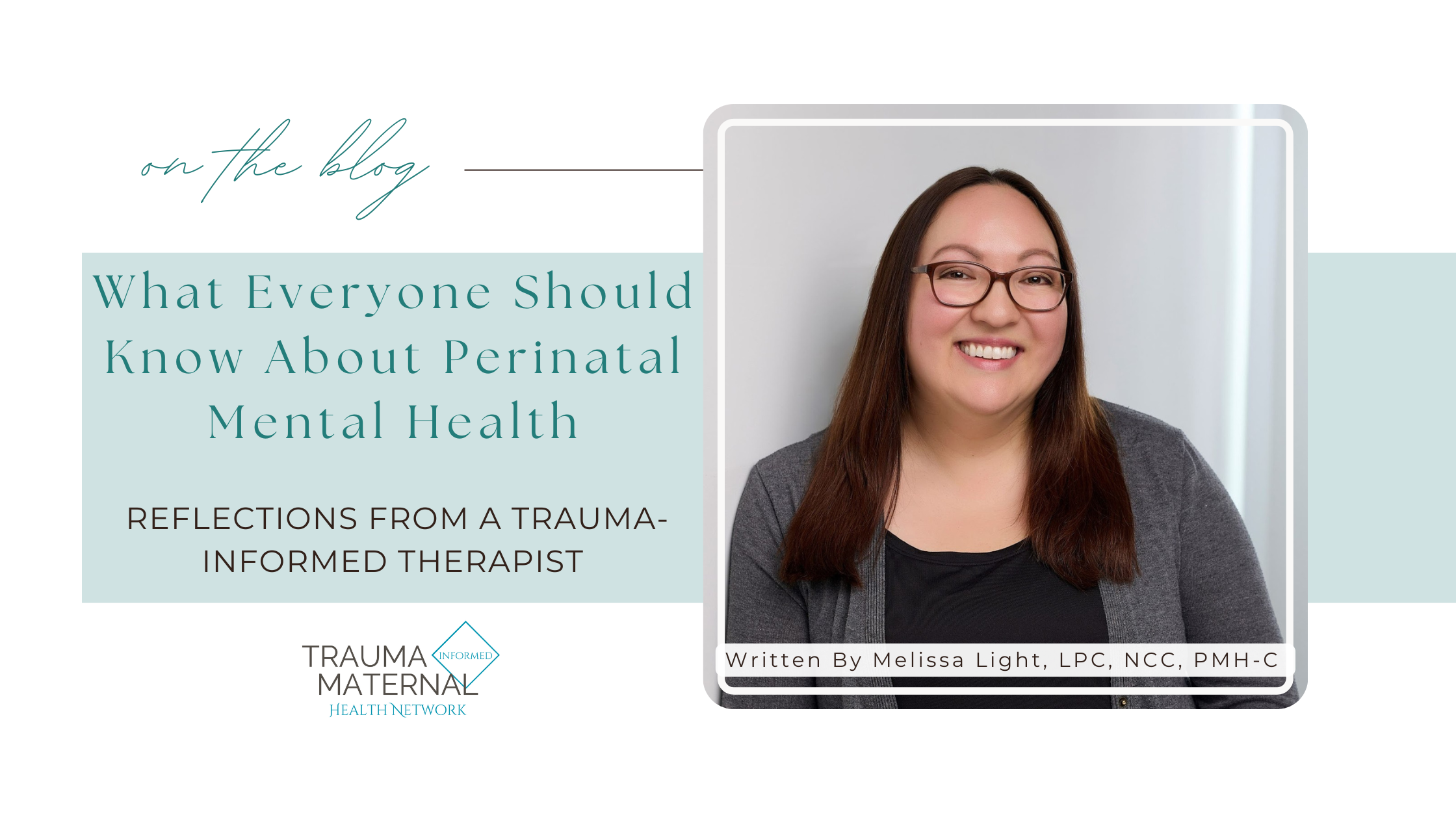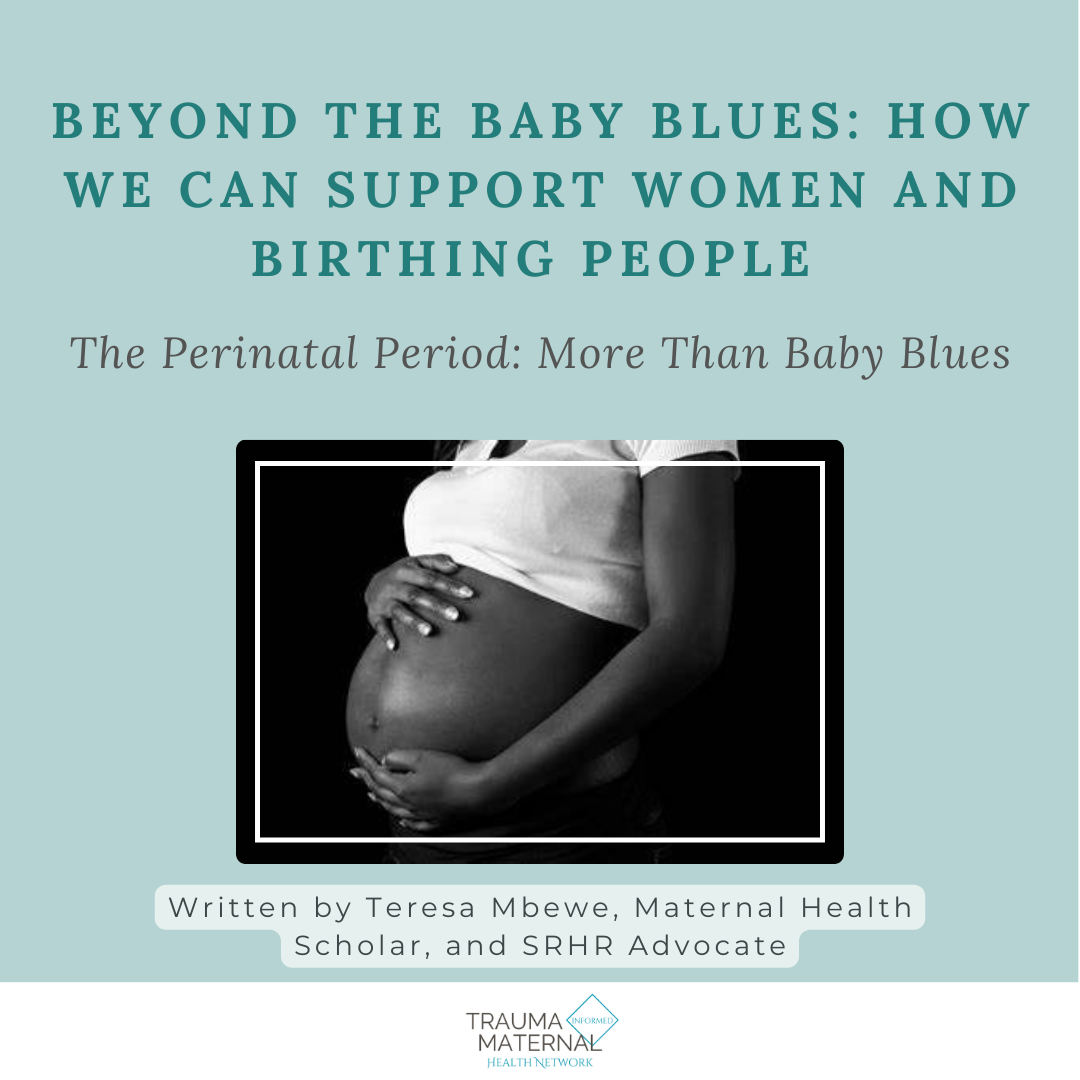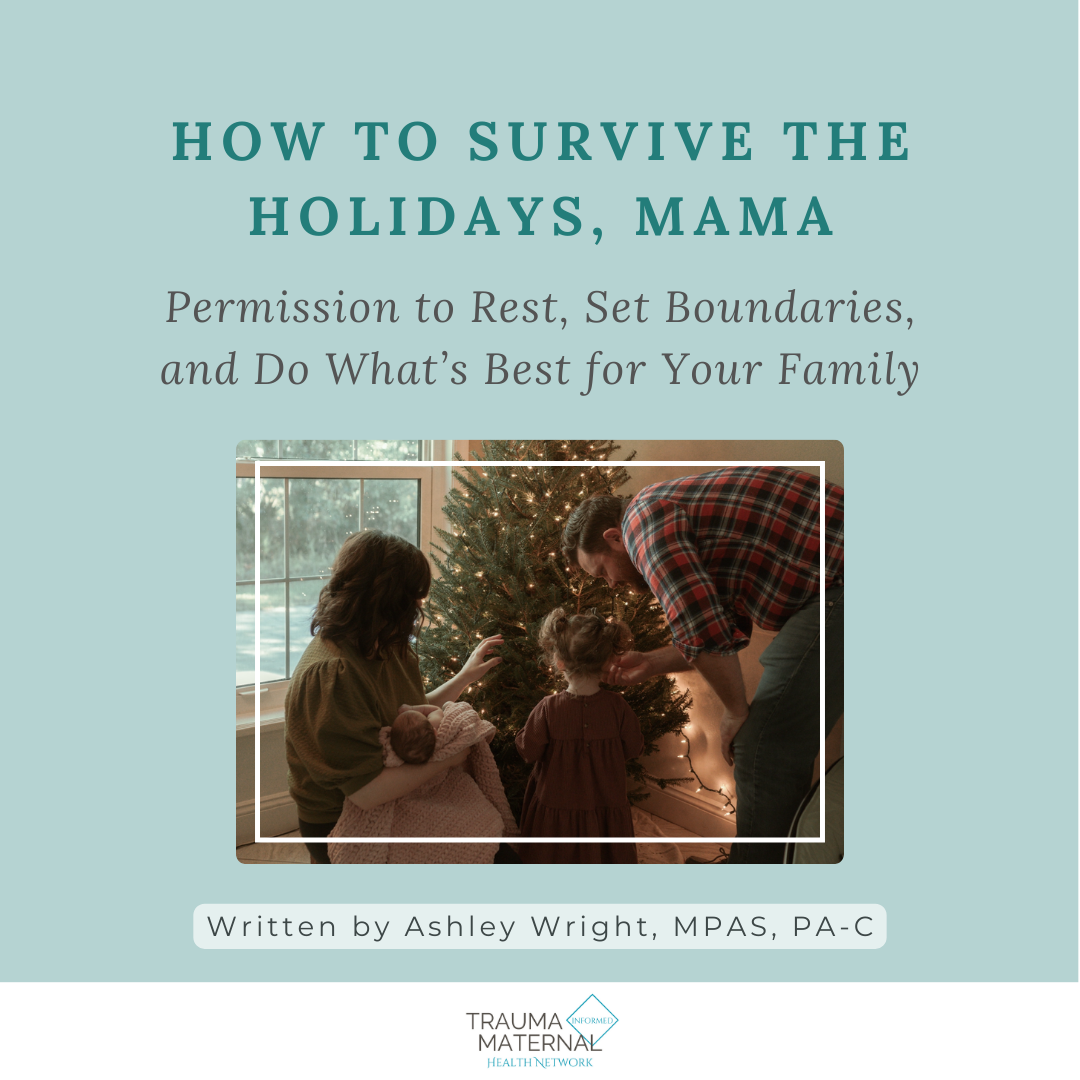What Everyone Should Know About Perinatal Mental Health: Reflections from a Trauma-Informed Therapist
Written by Guest Blogger Melissa Light, LPC, NNC, PMH-C
As a therapist who specializes in perinatal mental health, Melissa Light has supported a range of birthing people, from those who are trying to conceive to clients who are processing birth trauma and addressing perinatal mental health conditions. Trauma-informed therapy includes listening to a client’s story and helping them work through symptoms. Outside of the therapy session, addressing perinatal mental health involves advocating for clients on a community level by gathering resources, connecting providers, and providing information to the public to create networks to support birthing people and their families. In this article, Melissa shares her thoughts on society’s assumptions and misconceptions surrounding perinatal health, and her hope for how we can grow as a community to best support new parents.
Overlooked Areas of Perinatal Mental Health
There is so much information that I wish was common knowledge, starting with racial disparity. In the U.S., black women are three times more likely to experience a pregnancy-related death compared to their white counterparts (Collier & Molina, 2019; Hill et. al, 2024). According to data from the CDC, the Policy Center for Maternal Mental Health, and Hill et. al, preterm birth rates are higher for black women than for white women, and black women have higher rates of perinatal depression and post-traumatic stress disorder (PTSD) compared to white women.
One area that often gets overlooked by birthing people is their personal risk factors for perinatal mental health conditions. Often, people who have had one child and no history of a mood disorder assume they will not be at risk during a later pregnancy or birth. However, birthing people can experience a perinatal mental health condition even if they have no prior history of a mood disorder. Mood disorders do not only impact first-time moms. A birthing person can experience a mood disorder during or after any pregnancy.
Another major misconception is that only birthing people can experience perinatal mental health conditions. Partners of the birthing person can also experience either or both of these. In fact, studies show that 1 in 10 dads experience postpartum depression. What I have sometimes seen as a therapist is once a birthing person begins to feel better after treatment, their partner starts feeling worse- as if they were "staying strong" and "keeping it together" for their partner.
Common Barriers Faced by Birthing People
Some common barriers birthing people face include:
Limited access to care
Isolation/lack of social support
Stigma surrounding mental health and parenthood
Even for people with health insurance, navigating the system is complicated, and finding a provider can be a challenge. For those who have experienced medical trauma or have been marginalized or oppressed, it can be difficult to trust anyone in the medical field. Accessing appointments and taking leave from work can add to financial constraints. Lack of social support is a barrier, as new parents feel isolated for various reasons: lack of time to invest in friendships, having kids later in life and finding that grandparents are physically unable to help, being the first among their friend group to have baby, or part of a larger concern of social media impacting how connected they feel with others.
The most common barrier I have noticed is the stigma surrounding being a new parent and communicating feelings. A lot of new parents are scared they will say something that will get their child taken away, or they feel they must love every aspect of parenthood or will appear incompetent/ ungrateful/ undeserving of being a parent. With more information being shared on social media, some stigma has been broken. However, I am still seeing that new parents have "safe" topics they feel they can vocalize, but in other areas, they are hesitant to share their full thoughts or experiences with others in their lives.
What it Means to be a Trauma-Informed Therapist
As a therapist, a big part of my role during sessions is to listen to birthing people when they describe their experiences and to help them create a personal and professional community of support. I want to be a trusted ally who clients feel comfortable opening up to, but this is also connected to my work as an advocate outside of sessions. Now more than ever, it is important that anyone who can be a voice should be a voice to speak out about the healthcare disparity faced by marginalized and oppressed peoples. We need to provide support to professionals who may be in front of birthing people so that they can feel competent in screening for perinatal mental health conditions and making appropriate referrals. It really does take a community to support new parents, and the well-being of parents and families impacts the well-being of the community.
The Future of Maternal Mental Health
Experiences of birth trauma are often under-reported, and we as a field need to do better to:
Increase access to preventative care
Assess for mood disorders and ACES (Adverse Childhood Experiences) that impact a person's birthing experience
Be proactive in creating resources to provide to pregnant people
I would love to see greater coordination between all of the professionals who may be involved in a new parent's care, including OBGYNS, physical/pelvic floor therapists, chiropractors, lactation consultants, mental health counselors, postpartum doulas, etc. Many of my clients are unaware of the professional help available to them until they are postpartum and in urgent need, and at that point, trying to research and seek help for themselves becomes a lot harder. By increasing community awareness of needs and resources, we can help birthing people to know what to look for and seek preventative care, and we can help friends, family members, and professionals to be proactive in helping direct birthing people to support.
For anyone looking for support, a few places to start are:
- - - - -
Guest Author: Melissa Light, LPC, NCC, PMH-C
Melissa Light, LPC, NCC, PMH-C, is a Licensed Professional Counselor and nationally certified clinician with over a decade of experience supporting individuals in their emotional growth. Specializing in Perinatal Mental Health and adults with ADHD/autism, Melissa offers a compassionate, evidence-based approach that creates a space for clients to connect with themselves and feel more present in their lives as they navigate transitions, emotions, and personal growth.
Website: Aspen Grove Counseling and Wellness
Instagram: https://www.instagram.com/melissa_light_counselor/
About the Trauma-Informed Maternal Health Directory
Liz Gray, LCSW and Olivia Verhulst, LMHC, PMH-C— co-founders of the Trauma-Informed Maternal Health Directory— are clinical psychotherapists with a deep passion for increasing accessibility of trauma-informed care to the maternal health population.
They created this specialized directory to connect women & birthing people to trauma-informed health & mental health providers who specialize in infertility, pregnancy, postpartum, and new parenthood.
Search the directory: https://directory.maternaltraumasupport.com/
Interested in writing a guest blog post?
If you are a trauma-informed provider who works with the perinatal population, submit a blog proposal HERE!
Please make sure the article is original content that aligns with our values of safety, inclusion, transparency, collaboration, empowerment, and support.




